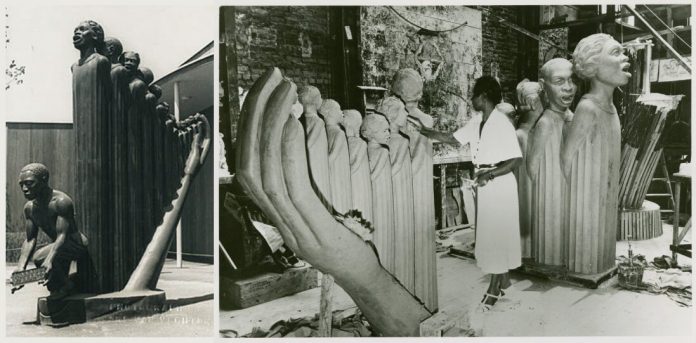Civil and Human Rights in Black Music
James Weldon Johnson wrote “Lift Every Voice and Sing,” the “Black National Anthem” (originally called the Negro National Anthem). The long and varied history of protest songs against slavery and white supremacy in America served as the foundation for the Civil Rights Movement’s musical style. In the fight against racism, protest songs lifted everyone up, brought them together, and gave them a fighting spirit. Early protest songs performed by enslaved African peoples were mostly modeled after church hymns, or songs from the slave plantations that were sung in the cotton fields which frequently featured religious themes of prayer, deliverance from affliction, emancipation from slavery, and resistance against racial hatred.
It is impossible to separate African American music from the slave trade. Black music was influenced by their native lands that they were ripped away from. During and after slavery, throughout the eras of Reconstruction and Jim Crow, music served as a comfort, a means of fostering community, and a voice for hope. Additionally, music was sung with hidden lyrical words and announcements of rebellion or plans to escape. African Americans made a significant, coordinated effort during the Civil Rights Movement to obtain fundamental rights and dignity that had been denied to them—often via violence, murder, and other cruel treatment. The protesters’ determination was raised, and their resolve was strengthened by resistance music. One song became the movement’s anthem: “We Shall Overcome.” It struck a chord with the demonstrators and was linked to the cause of the Civil Rights Movement. However, Martin Luther King considered the Impressions’ song “People Get Ready” the unofficial anthem of the civil rights movement.
African American music cannot be separated from the slave trade and resistance to white supremacy. The cultures from which Black people were torn, and the conditions into which they had to endure, contributed to the sounds of African American music. Music was a solace, a community-builder, and voice for hope during enslavement and afterward, in the days of Reconstruction and then Jim Crow. The Civil Rights Movement was a major concerted effort by African Americans to gain basic rights and dignities that were denied to them, often by force, murder, and brutality. Music lifted spirits and united protestors and supporters while strengthening their resolve against white supremacy.
Music around the world is a way of connecting with other ethnic groups and cultures. Music overcomes language, gender, age, and cultural barriers. It is a powerful political force, and Black people have used music over the centuries to connect with one another and with the African heritage from which they were torn. Martin Luther King Jr. had a deep respect for music as an instrument of change. The March on Washington in 1963, where King delivered his & “I Have a Dream” speech, featured live performances by Harry Belafonte, Marian Anderson, Mahalia Jackson, Joan Baez, and Bob Dylan, just to name some. In 1963, Sam Cooke set the stage with his song “A Change is Gonna Come.”
Even before Sam Cooke, was Billy Holiday’s song, “Strange Fruit,” written in 1939, which was about white terrorism in America with Black men murdered and hanging from trees. Today, rap artists have infused their music with words of freedom and the tradition continues with Artists like Samuel Jackson and his rendition of “I Can’t Breathe” for the Black Lives Matter Movement. Bob Marley sang “Redemption Song” and the “Black Survivors.” There were many others, including Donny Hataway’s song (1973) of “Someday We’ll All Be Free,” Marvin Gay’s song (1971), “What’s Going On,” and tons of others.” and the “Black Survivors.” There were many others, including Donny Hataway’s song (1973) of “Someday We’ll All Be Free,” Marvin Gay’s song (1971), “What’s Going On,” and tons of others.








